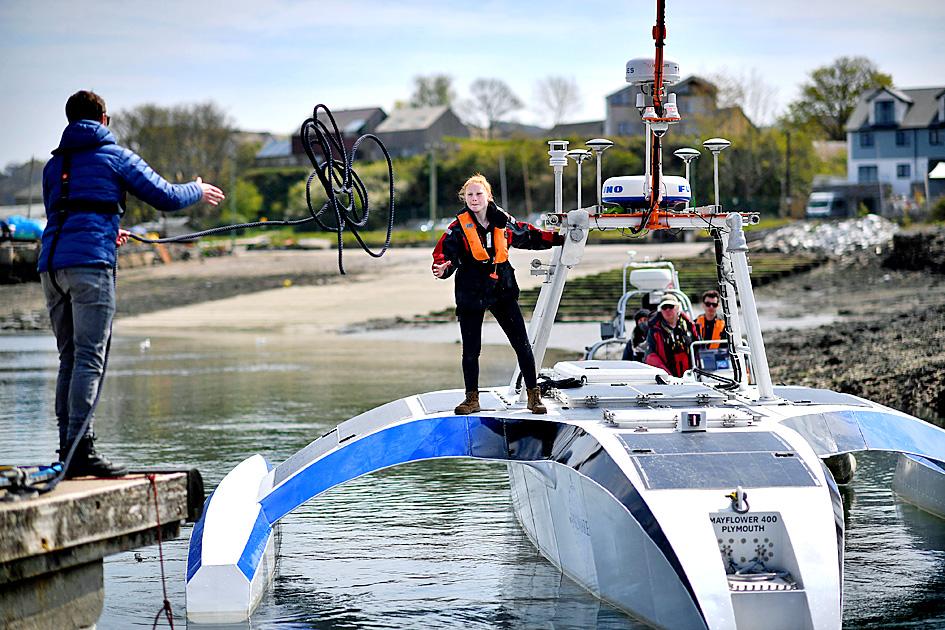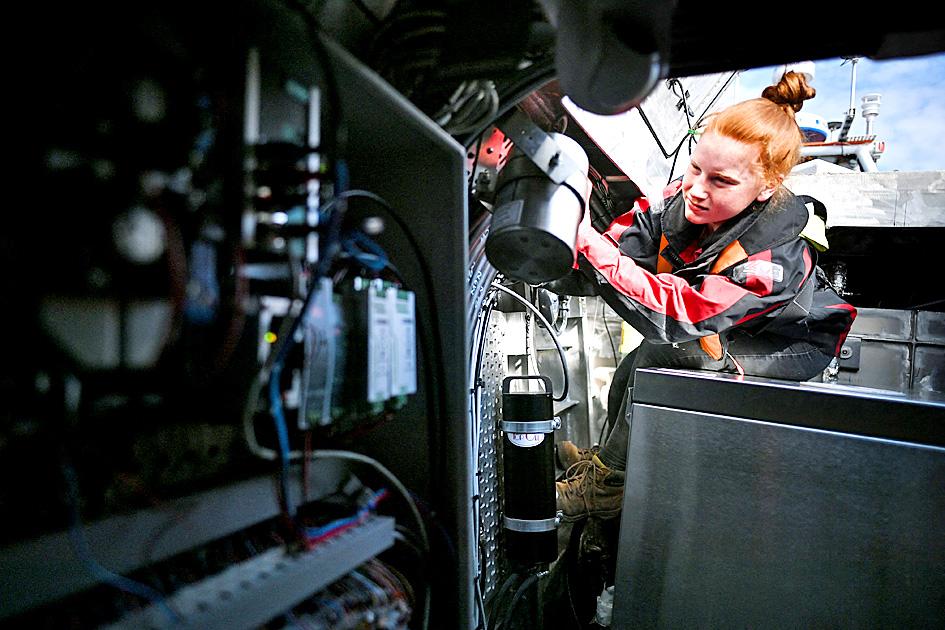The Mayflower 400 — the world’s first intelligent ship — bobs gently in a light swell as it stops its engines in Plymouth Sound, off England’s southwest coast, before self-activating a hydrophone designed to listen to whales.
The 15m trimaran, which weighs nine tonnes and navigates with complete autonomy, is preparing for a transatlantic voyage.
On its journey the vessel, covered in solar panels, is to study marine pollution and analyze plastic in the water, as well as track aquatic mammals.

Photo: AFP
Eighty percent of the underwater world remains unexplored.
Brett Phaneuf, cofounder of the charity ProMare and the mastermind behind the project, said the ocean exerts “the most powerful force” on the global climate.
Rosie Lickorish, a specialist in emerging technologies at IBM, one of the partners on the project, said the uncrewed craft provides an advantage in the “unforgiving environment.”

Photo: AFP
“Having a ship without people on board allows scientists to expand the area they can observe,” she said.
A variety of technology and service providers have contributed to the project with hundreds of individuals involved from nations including India, Switzerland and the US, Phaneuf said.
The project would have cost 10 times the roughly US$1 million invested by ProMare without the “global effort,” he added.
The non-profit venture is to offer the data gathered by the project free of charge. The information could be of particular use to commercial shipping.
The ship is scheduled to embark on Saturday next week if weather is favorable and permission is granted by British authorities.
The journey to Plymouth, Massachusetts — the same voyage made by pilgrims on the original Mayflower in 1620 — is expected to take three weeks.
While the Mayflower 400 voyage has been delayed because of the COVID-19 pandemic, Phaneuf said at least no one would fall ill on the trip.
“No one will get bored or tired or sick on this one. So it can take as long as it likes to do science,” he said.
Sitting alongside him were three computer technicians checking the equipment remotely. Meirwen Jenking-Rees, a 21-year-old student engineer, checked the ship’s engines before it headed out for a sea trial.
Construction of the trimaran, which is automated from the robotic rudder that steers it to the diesel generator that supplements its solar power, took a year.
Developing its “smart captain,” the onboard artificial intelligence, took even longer, as the computer has had to learn how to identify maritime obstacles by analyzing thousands of photographs.
The Mayflower 400 also had to be taught how to avoid collisions, and first went to sea for “supervised learning.”
Robotics and software engineer Ollie Thompson said that by running a “number of scenarios” the ship can learn “what are good actions, bad actions, so safe and unsafe.”
If it makes a mistake, the boat can correct itself “and then learn itself,” Thompson added.
The automated vessel uses its “eyes” and “ears” — a sophisticated system of six cameras and radar — to continue learning on its own.
Due to a lack of regulations around unmanned sailing, the Mayflower 400 is yet to be tested in rough seas or storms, a situation Jenking-Rees described as a “worst case scenario.”
However, in simulated settings the robotic craft has faced 50m waves.
Lickorish said that the boat’s artificial intelligence would be pivotal in conducting scientific experiments.
“It was trained with hundreds of hours of audio data, to detect the presence of marine mammals, recognize the marine mammals and actually tell us something about population distributions out in the open ocean,” she said.
Analyzing the chemical composition of the water, measuring sea levels and collecting samples of microplastics are the ship’s other missions.
Similar robotic data collection has been ongoing in space for decades.
While the ship is totally autonomous, the team plans to monitor it 24 hours a day from England, ready to intervene remotely in case of danger.

A feud has broken out between the top leaders of the far-right Alternative for Germany (AfD) party on whether to maintain close ties with Russia. The AfD leader Alice Weidel this week slammed planned visits to Russia by some party lawmakers, while coleader Tino Chrupalla voiced a defense of Russian President Vladimir Putin. The unusual split comes at a time when mainstream politicians have accused the anti-immigration AfD of acting as stooges for the Kremlin and even spying for Russia. The row has also erupted in a year in which the AfD is flying high, often polling above the record 20 percent it

Ecuadorans are today to vote on whether to allow the return of foreign military bases and the drafting of a new constitution that could give the country’s president more power. Voters are to decide on the presence of foreign military bases, which have been banned on Ecuadoran soil since 2008. A “yes” vote would likely bring the return of the US military to the Manta air base on the Pacific coast — once a hub for US anti-drug operations. Other questions concern ending public funding for political parties, reducing the number of lawmakers and creating an elected body that would

The latest batch from convicted sex offender Jeffrey Epstein’s e-mails illustrates the extraordinary scope of his contacts with powerful people, ranging from a top Trump adviser to Britain’s ex-prince Andrew. The US House of Representatives is expected to vote this week on trying to force release of evidence gathered on Epstein by law enforcement over the years — including the identities of the men suspected of participating in his alleged sex trafficking ring. However, a slew of e-mails released this week have already opened new windows to the extent of Epstein’s network. These include multiple references to US President Donald

CHARGES: The former president, who maintains his innocence, was sentenced to 27 years and three months in prison for a failed coup bid, as well as an assassination plot Far-right former Brazilian president Jair Bolsonaro is running out of options to avoid prison, after judges on Friday rejected his appeal against a 27-year sentence for a botched coup bid. Bolsonaro lost the 2022 elections and was convicted in September for his efforts to prevent Brazlian President Luiz Inacio Lula da Silva from taking power after the polls. Prosecutors said the scheme — which included plans to assassinate Lula and a top Brazilian Supreme Court judge — failed only due to a lack of support from military top brass. A panel of Supreme Court judges weighing Bolsonaro’s appeal all voted to uphold